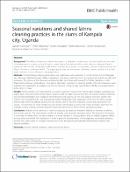Seasonal variations and shared latrine cleaning practices in the slums of Kampala city, Uganda
Date
2016-04-27Author
Kwiringira, Japheth
Atekyereza, Peter
Niwagaba, Charles
Kabumbuli, Robert
Rwabukwali, Charles
Kulabako, Robinah
Günther, Isabel
Metadata
Show full item recordAbstract
The effect of seasons on health outcomes is a reflection on the status of public health and the state
of development in a given society. Evidence shows that in Sub-Saharan Africa, most infectious diseases flourish
during the wet months of the year; while human activities in a context of constrained choices in life exacerbate the
effects of seasons on human health. The paper argues that, the wet season and when human activities are at their
peak, sanitation is most dire poor slum populations.
Methods: A shared latrine cleaning observation was undertaken over a period of 6 months in the slums of Kampala
city. Data was collected through facility observations, user group meetings, Focus group discussions and, key informant
interviews. The photos of the observed sanitation facilities were taken and assessed for facility cleanliness or dirt.
Shared latrine pictures, observations, Focus Group Discussion, community meetings and key informant interviews were
analysed and subjected to an analysis over the wet, dry and human activity cycles before a facility was categorised as
either ‘dirty’ or ‘clean’.
Results: Human activity cycles also referred to as socio-economic seasons were, school days, holidays, weekends and
market days. These have been called ‘impure’ seasons, while the ‘pure’ seasons were the wet and dry months: improved
and unimproved facilities were negatively affected by the wet seasons and the peak seasons of human activity. Wet
seasons were associated with, mud and stagnant water, flooding pits and a repugnant smell from the latrine cubicle
which made cleaning difficult. During the dry season, latrines became relatively cleaner than during the wet
season. The presence of many child(ren) users during school days as well as the influx of market goers for the
roadside weekly markets compromised the cleaning outcomes for these shared sanitation facilities.
Conclusion: Shared latrine cleaning in slums is impacted by seasonal variations related to weather conditions
and human activity. The wet seasons made the already bad sanitation situation worse. The seasonal fluctuations
in the state of shared slum sanitation relate to a wider malaise in the population and an implied capacity deficit
among urban authorities. Poor sanitation in slums is part of a broader urban mismanagement conundrum pointing
towards the urgent need for multiple interventions aimed at improving the general urban living conditions well
beyond sanitation.

